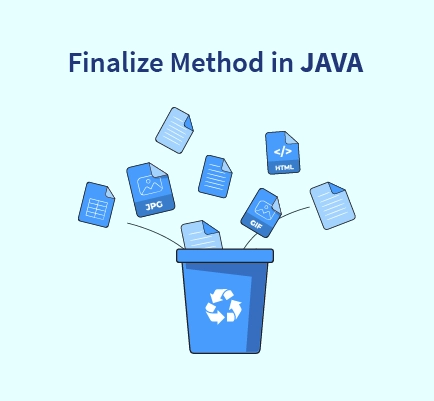finalize method in java
The finalize method in Java is a method provided by the Object class. It’s called by the garbage collector before an object is reclaimed (i.e., before it is garbage-collected) to perform cleanup operations. The primary purpose of the finalize method is to allow an object to release resources or perform other cleanup actions before it is no longer reachable.

Here’s a brief overview of the finalize method and its usage:
1. Method Signature:
- The
finalizemethod has the following signature in theObjectclass:
protected void finalize() throws Throwable;
2. Usage:
- When an object is no longer reachable (i.e., there are no references to it), the garbage collector identifies it as a candidate for garbage collection.
- Before the object is actually reclaimed, the
finalizemethod is called if it’s overridden in the class of the object.
3. Cleanup Operations:
- The
finalizemethod can be used to perform cleanup operations such as closing files, releasing network resources, or any other activities that need to be completed before the object is garbage-collected.
4. Caution and Best Practices:
- While the
finalizemethod provides an opportunity for cleanup, it’s important to note that relying on it for critical resource management is not recommended. - The timing of when
finalizeis called is not guaranteed, and there is no certainty about when the garbage collector will run. - Modern Java applications often use other mechanisms, like try-with-resources for resource management, which provide more predictable behavior.
5. Deprecated in Java 9:
- In Java 9, the
finalizemethod has been deprecated with a warning that it is often misused and is inherently problematic. The recommendation is to use other mechanisms for resource management.
Here’s a simple example to illustrate the use of finalize:
class ResourceHolder {
// Some resource or state to be cleaned up
private String resource;
public ResourceHolder(String resource) {
this.resource = resource;
}
@Override
protected void finalize() throws Throwable {
try {
// Cleanup operations, e.g., closing a file
System.out.println("Finalizing: " + resource);
} finally {
// Call the finalize method of the superclass
super.finalize();
}
}
}
public class FinalizeExample {
public static void main(String[] args) {
// Creating an object that requires cleanup
ResourceHolder resourceObj = new ResourceHolder("File.txt");
// Making the object eligible for garbage collection
resourceObj = null;
// Explicitly triggering garbage collection (for illustration purposes)
System.gc();
}
}
In this example, the finalize method of the ResourceHolder class is called before the object is garbage-collected, allowing for cleanup operations to be performed. Keep in mind that relying on finalize is generally discouraged, and alternative resource management techniques are preferred in modern Java development.
